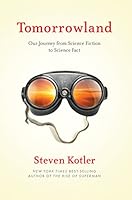
Tomorrowland

And, just like us, animals are known to take specific drugs for specific purposes. Among the Navajo, the bear is revered for teaching them about osha, a root effective against stomach pains and bacterial infections. Wild carrot, as we learned from birds, repels mites. Horses in pain will hunt for willow stems, because that’s where aspirin comes
... See moreSteven Kotler • Tomorrowland
The drug Allan’s considering for the first session is MDMA, known on the street as Ecstasy, and a latecomer to the psychedelic tool kit. First discovered by Merck in 1912, MDMA didn’t hit the therapeutic world until the middle 1970s when pharmacologist Alexander Shulgin, then teaching at the University of California, San Francisco, heard from his
... See moreSteven Kotler • Tomorrowland
This terrible knowledge of our eventual end is the so-called human condition. And it is quite a condition. In 1974, psychologist Ernest Becker won the Pulitzer Prize for his book The Denial of Death, wherein he argues that everything we think of as society — from the cities we construct to the religions we believe in — is nothing more than an
... See moreSteven Kotler • Tomorrowland
For starters, while the Bush administration and the evangelical right are waging war against stem cells, neither has said a peep about fertility clinics. Yet, during the normal process of in vitro fertilization, embryos are destroyed by the boatload. Current techniques cull twenty or so embryos for every one that’s implanted. The remainder are
... See moreSteven Kotler • Tomorrowland
Then Molnar remembered an advertisement from his childhood for a gyrocopter, a type of “rotorcraft” invented in 1923 by Spanish engineer Juan de la Cierva. Gyrocopters use an unpowered rotor for lift (like a helicopter) and an engine-powered propeller for thrust (like a small plane) and have the distinct advantage of being able to land at very slow
... See moreSteven Kotler • Tomorrowland
Britton also knew about work done by legendary neurosurgeon and epilepsy expert Wilder Penfield in the 1950s. Penfield, one of the giants of modern neuroscience, discovered that stimulating the brain’s right temporal lobe — located just above the ear — with a mild electric current, produced out-of-body experiences, heavenly music, vivid
... See moreSteven Kotler • Tomorrowland
In our view, it’s no longer a question of might. Advances in biotechnology are quickly and radically changing the scientific landscape. We are entering a world where imagination is the only brake on biology, where dedicated individuals can create new life from scratch. Today, when a difficult problem is mentioned, a commonly heard refrain is,
... See moreSteven Kotler • Tomorrowland
Of course, it would have to be a really powerful playback device like, say, the virtual reality systems that are now hitting the market. Cochrane envisions a Tomorrowland version of the Oculus Rift, meaning not the VR system that Facebook just bought for a billion dollars, but the one that’s going to emerge after they spend another billion
... See moreSteven Kotler • Tomorrowland
Irv Weissman’s home is about twenty minutes from Stanford University, hidden from the road by a tall stand of trees. Inside, the rooms are spacious, and the living room more so. The ceiling is high and broad-beamed; the furniture Western chic: chairs hewn from tree branches, tables built from tree trunks. Spread out in front of the fireplace is a
... See more